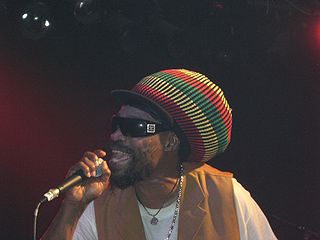
Michael Rose is a Jamaican reggae singer. He is most widely known for a successful tenure as the lead singer for Black Uhuru from 1977 to 1984, followed by a lengthy solo career. He has been praised as "one of Jamaica's most distinguished singers" and for launching a distinctive form of reggae singing that originated in his home neighborhood of Waterhouse in Kingston.
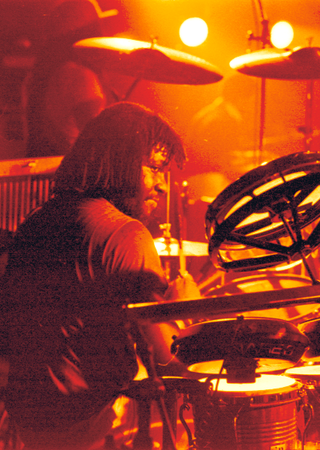
Lowell Fillmore "Sly" Dunbar is a Jamaican drummer, best known as one half of the prolific Jamaican rhythm section and reggae production duo Sly and Robbie.

Sly and Robbie were a prolific Jamaican rhythm section and production duo, associated primarily with the reggae and dub genres. Drummer Sly Dunbar and bassist Robbie Shakespeare teamed up in the mid-1970s after establishing themselves separately in Jamaica as professional musicians. Shakespeare died in December 2021 following kidney surgery.

Judith Veronica Mowatt, is a Jamaican reggae artist. As well as being a solo artist, from 1974 she was also a member of the I Threes, the trio of backing vocalists for Bob Marley & The Wailers.

Aston Francis Barrett, CD, often called "Family Man" or "Fams" for short, was a Jamaican musician and Rastafarian. He was best known as the bandleader of Bob Marley's backing band, as well as co-producer of the albums, and the man in charge of the overall song arrangements.
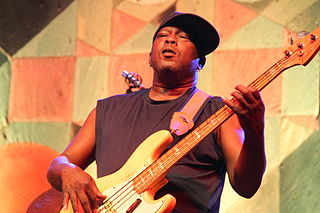
Robert Warren Dale Shakespeare was a Jamaican bass guitarist and record producer, best known as half of the reggae rhythm section and production duo Sly and Robbie, with drummer Sly Dunbar. Regarded as one of the most influential reggae bassists, Shakespeare was also known for his creative use of electronics and production effects units. He was sometimes nicknamed "Basspeare".

Throw Down Your Arms is the seventh studio album by Sinéad O'Connor, also known as her reggae album. O'Connor sings cover versions of classic roots reggae songs, with production by Sly and Robbie.
Socialist Roots Hi-Fi was a prominent Jamaican reggae sound system and record label owned by Tony Welch in the 1970s and early 1980s. It was originally named King Attorney. The name changed in 1976 when Welch bought the set. Regular deejays included Ranking Trevor, U Brown, Jah Mikey and Nicodemus, alongside the regular selector Danny Dreadlocks. They received dub cuts from Bob Marley & The Wailers. After 1981, the group was known as Papa Roots Hi-Fi.

Baldhead Bridge is the second album by the Jamaican roots reggae band Culture, released on Joe Gibbs Records in 1978.
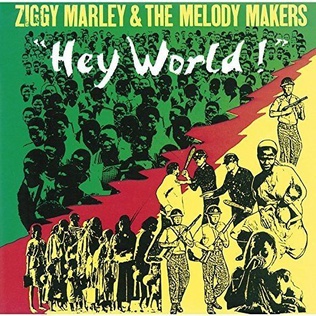
Hey World! is the second album by Ziggy Marley and the Melody Makers, released in 1986.

Sinsemilla is the third album by Jamaican reggae band Black Uhuru, released in 1980 on the Island Records subsidiary Mango. The album helped the band achieve a global fanbase.
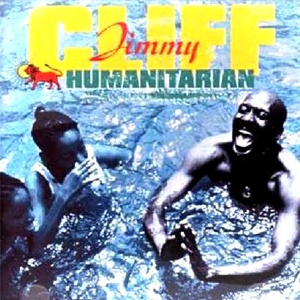
Humanitarian is a 1999 album by Jimmy Cliff.

Right Time is the 1976 studio album debut of influential reggae band the Mighty Diamonds. The album, released by Virgin Records after they signed the Mighty Diamonds following a search for talent in Jamaica, is critically regarded as a reggae classic, a landmark in the roots reggae subgenre. Several of the album's socially conscious songs were hits in the band's native Jamaica, with a few becoming successful in the UK underground. Influential and sometimes unconventional, the album helped secure the success of recording studio Channel One Studios, and rhythm team Sly Dunbar and Robbie Shakespeare.

The Third Power is a 1991 album by the New York based music group Material. The album mixes reggae, funk, dub and rap music.

Aux Armes et cætera is the thirteenth studio album by Serge Gainsbourg, released in the early spring of 1979. It was recorded in Kingston, Jamaica, with some of the island's best reggae musicians at the time as well as members of the I Threes, Bob Marley's backup chorus which includes Rita Marley. Further expanded by new mixes, dubs and Jamaican versions released in 2003 and 2015, the album is considered by many as one of his masterpieces. The French edition of Rolling Stone magazine named this album the 50th greatest French rock album. The recording marked the first time a white singer had recorded a full reggae-influenced album in Jamaica, following previous single-song recordings from Paul Simon and Peter Tosh and Mick Jagger. By 1991, it sold 650,000 copies in France.

Hall of Fame: A Tribute to Bob Marley's 50th Anniversary is an album by Bunny Wailer, released through RAS Records in November 1995. In 1997, the album won Wailer the Grammy Award for Best Reggae Album.

Rhythm Killers is an album by Jamaican musical duo Sly and Robbie, released in May 1987 by Island Records. By the time of the album's recording, Sly and Robbie had transitioned away from their prolific work in the reggae genre. They spent the 1980s experimenting with electronic sounds and contemporary recording technology on international, cross-genre endeavors, which influenced their direction for Rhythm Killers.

Mauvaises nouvelles des étoiles is the fourteenth studio album by French singer-songwriter Serge Gainsbourg. It was released through Mercury Records and Universal Music Group on 17 November 1981. Produced by Philippe Lerichomme, the album musically follows the reggae style of its predecessor, Aux Armes et Caetera (1979).

Toots in Memphis is an album by the Jamaican musician Toots Hibbert. Released in 1988, Toots in Memphis was recorded without the Maytals. The majority of the album's tracks are covers of American R&B songs.

Barrington is an album by the Jamaican musician Barrington Levy, released in 1993. It was regarded as a crossover attempt. The first single was "Murder". Levy supported the album with a North American tour.


















